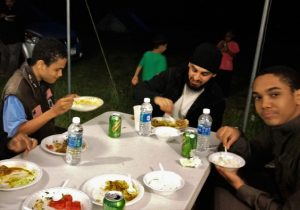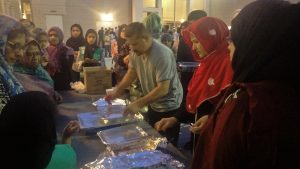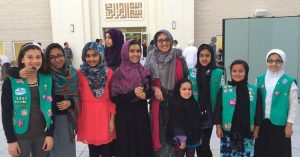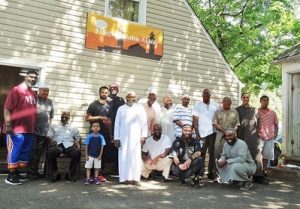NEW YORK – For billions of Muslims across the globe, Ramadan is a month of individual fulfillment and communal spiritual enrichment. In addition to fasting the daylight hours, Muslims engage in numerous special activities at home and their area mosques.
In mosques throughout the United States, fasting visitors are offered special meals, known as iftar, to break their fasts. I had the opportunity to visit mosques of various sizes in Long Island, NY, to see the multitude of ways American Muslim communities offer iftar during Ramadan.
Islamic Center of Mastic-Shirley, Shirley, NY
The Islamic Center of Mastic-Shirley comprises of a diverse population of Muslims from various backgrounds, including African-Americans, Arabs, Euro-Americans, Latino-Americans, and South Asians.
The mosque offers nightly iftar meals to visitors sponsored by community volunteers. The food served at the mosque’s iftar meals often reflects the diversity of the community.
Latino-American Najee Hassan, who leads the Islaamic Center of Mastic-Shirley’s security team, explained to AboutIslam.net, “It’s a very diverse masjid. You get to understand various different cultures in their food, in their practice, and in their behaviors.
“During the month of Ramadan, we get to eat very different meals from different cultures, and that is a blessing,” he added.
Islamic Center of New York, Westbury, NY
The Islamic Center of New York is one of the largest mosques in Long Island, NY. The mosque offers iftar meals every evening through donations and volunteers who host them.
Wajiha Tahir’s family hosts some meals and nobly serves fasters. Tahir provided AboutIslam with the history of how the Islamic Center of New York began serving meals.
“There were students who lived in the houses over here, and they didn’t have anyone to do iftar for them. My dad was friends with a bunch of them and decided to bring a bunch of people and we started doing it. It slowly became that everyone was picking out a day during Ramadan to bring in food or donate money,” he told AboutIslam.
Tahir, a recent high school graduate, credits her father for her dedication in serving iftar meals for over 5 years. “It’s basically my dad. It’s an easy blessing.”
On the night I visited the Islamic Center of New York, the community’s girls scout troop hosted the evening’s meal. This is the troop’s second year hosting a community iftar.
“The girl scout troop has been here for almost a decade,” troop mother Sarah Eltabib told About Islam, “We get our girl scout moms to contribute.”
According to Eltabib, community iftar meals at the center may range in cost from $500 to $800.
The scouts attended the iftar in their uniforms as a sign of their solidarity with each other and commitment to their Muslim community.
“This is something that they’ve accomplished together,” Eltabib explained to About Islam. The troop comprises of Muslim girls from diverse backgrounds, and sponsoring a community iftar makes them part of a growing tradition in American Muslim mosques, which is not without its challenges. Eltabib noted some issues that may detract from the overall positive experience of attending a large-scale community iftar.
“I see a side of people I don’t like to see. There is a little bit of greediness, and some people take too much food when there is a long line of people behind them.” However, she also expressed the importance of breaking fasts communally.
“I do love community, and I do love being a part of it, especially when there are people who need the iftar. Community iftars in Egypt, which is where I am from, are actually for poor people.”
Masjid Allahu Akbar, Wyandanch, NY
Masjid Allahu Akbar services a small community of predominately African-American Muslims.
The mosque offers weekend iftars sponsored by community volunteers and occasionally local halal restaurants. The mosque’s members frequently have potluck meals, which provide a cozier atmosphere for fasters.
Djamila Abdel-Jaleel, who is visiting family and friends in New York from Florida, told AboutIslam, “I enjoy the smaller intimate iftars here because I often get a home-cooked American meal. At larger iftars, the food is typically not ethnically specific, but you rarely get American fare.”
Community iftar meals are increasingly becoming an integral part of the American Muslim tradition.
Whether it is for a much-needed meal or to share in the positive nature of the blessed month, those fasting continue to attend their local mosques to break their Ramadan fasts and enjoy each other.
